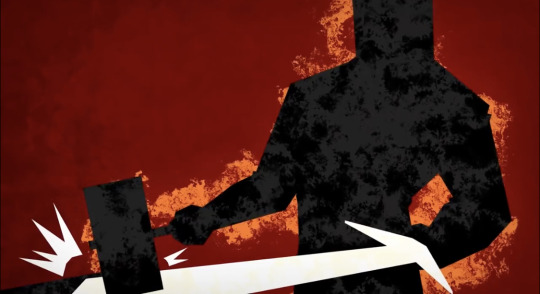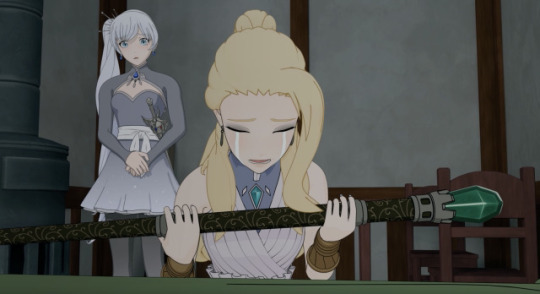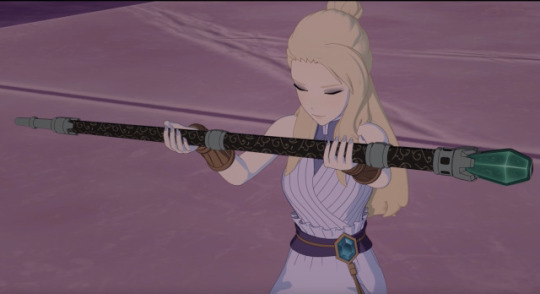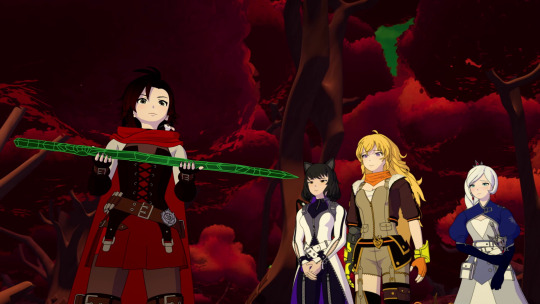#living in exile while ozma campaigns to destroy her and she has either. reached a breaking point where she can't live like this anymore
Explore tagged Tumblr posts
Text
…salem did not do anything wrong.
she was a grieving young woman who prayed to the gods to spare her lover from death. because she was religious. she had faith in her creators and felt hope that they might help her. when the god of light denied her, she got upset in the moment, but she accepted that he had refused and—this part is important—she left him the flowers she'd brought him.
the way rwby handles divinity is very polytheistic and specifically influenced by ancient greek and roman practice (also hellenistic philosophy). a fundamental concept in roman polytheism is "do ut des," which we might translate loosely as "i give so that you may give." polytheistic worship involves reciprocation, a give and take between human and divine, and roman polytheism was particularly contractual in nature. you perform a ritual, make an offering, and pray to inform the god of why: either you're asking for a favor, or returning a favor already given, or you're simply trying to stay on good terms.
of course, asking (even in the right way) does not guarantee that the god will do what you want. but there is an expectation of reciprocity; that the god will participate in this arrangement with you. you must ask—ritual without prayer is futile—and you must accept that sometimes the answer will be "no."
salem brings flowers to the god of light, which appear to be an appropriate offering based on the assortment of other items placed around the shrine. then she asks him for a favor he is unwilling to give, and he refuses and sends her away from his domain. her "no" (in response to "let him rest") is generally interpreted as a refusal to take no for an answer—but it isn't. she does not try to force her way back into light's domain to demand that he bring ozma back, nor does take back her offering.
this woman felt no qualms about going before the god of darkness—a god nobody else dared to worship, one known solely as the progenitor of monsters—to pray for ozma's life. if she truly felt entitled to a miracle, her respect for this reciprocal form of worship would have ended when the god of light told her no; she would not have felt bound to uphold her end of the arrangement. she would not have left the flowers there.
but she did.
her decision to then petition the god of darkness is similarly often taken as an act of disobedience, of going behind the god of light's back to get what she wanted after he told her no, but:
the god of light told her that she had asked something he "cannot make so"—not will not, cannot. if salem took him at his word, it would not have been unreasonable to assume that he said no because bringing ozma back was beyond his power, but that perhaps the god of darkness could do it.
the brothers shared in the creation of the world and made humans together, as equals. there was not a hierarchy with the god of light above his brother—the god of light did not have standing to forbid worship of darkness. (which darkness points out during their confrontation.)
because we do not get to hear what salem told the god of darkness, we only have jinn's word that salem "made no mention of his elder" with intent to deceive and manipulate him. jinn is not a reliable narrator—there are details in her telling that are verifiably factually untrue, like the god of light being "the elder"—so this information is suspect. it is equally plausible that salem did not mention light because he wasn't relevant, having no involvement in whatever pact she struck with darkness, or that she made an implicit promise to revere darkness above his brother if he granted her wish. both would be within her rights.
from the very beginning, salem intended to petition both brothers. when ozma dies, she asks "how could the gods let this happen?" and jinn clarifies that she meant both light and darkness. she could not go to both of them at once—they were not in the same place—so she chose to approach the "safer" brother first. but she always meant to ask them both.
all of that is to say, returning to the point i made in the op: when salem offered ozma's staff to the god of darkness, she chose to risk that he, too, would take it from her and then turn her away empty-handed. that staff was her most prized possession, the only thing she had left of ozma, and offering it as a votive gave the god of darkness the means to hurt her very badly. she knew that, he knew that, and i think that is something salem did very deliberately because she thought about what he might want from her in return for this favor she asked of him. the grimm are drawn to pain and suffering, the god of darkness made the grimm, she offers him an object that represents her loss, one which she would be devastated to lose. you see the line of reasoning? there was no established praxis for her to follow with darkness (as she did with light), so she did her best to give him something he would appreciate.
and that is exactly why he gives her what she wants: salem believed in him, proved that her faith in him was true, so he gives back. reciprocity. insofar as there was any wrongdoing here, it was darkness neglecting to get his brother's consent per their agreement not to act unilaterally—but… light did that too, and he's been doing it ever since their fight over jabber, so that agreement was never made in good faith.
salem did nothing wrong. she was literally just a religious woman who prayed to the gods she had been worshipping all her life. what she does in the lost fable—making offerings to them both and asking a favor in return—is literally just practicing her religion. that is How Polytheistic Religion Works. the gods punish her brutally for worshipping them.
and she does learn from this experience. she learns that her faith in the brothers was misplaced, that the god of light does not want to be worshipped but rather obeyed, that the god of darkness was fickle and cruel, that the permanence of death is not the inherent natural way of the world but an artificial order imposed by the brothers—she hears light say that explicitly while he's arguing with darkness and they punish her by excluding her from their "delicate balance of life and death"—and that the brothers are neither all-powerful nor all-knowing. that they're fallible. that humankind does not need them, and would in fact be better off without them.
salem, er, "doubles down" every time she's given a choice to recant and submit to the god of light because she's right. she refuses to "learn her lesson" because the intended lesson is that the god of light is entitled to demand absolute, unquestioning obedience and give nothing in return because humans are worthless. she rejects ozma and his divine mandate because she does not believe that the brothers have the right to kill everyone if they don't get their way.
ruby learns from her experience too: she learns that the brothers are not absolute cosmic authorities, that they are not all-powerful or all-knowing, that the god of light was wrong. the blacksmith tells them all in no uncertain terms that light's understanding of balance is wrong. salem knows this. she has known this for hundreds of millions of years. she doesn't need to learn it because she already knows—and there's also, uh, a serious possibility that she knows the blacksmith too:

"aura is a manifestation of the soul." world of remnant is narrated in character and all of them carry implications about what the narrating character believes or perceives about their subject—for example, see qrow's blatant editorializing in all of his spots. salem narrates the aura episode; when she describes aura as a manifestation of the soul, a life-force running through every living thing on remnant, the associated imagery is a blacksmith. what does this imply about what—or who—she might know?
rolls over
yeah yeah, the ruby-salem grief weapon parallel, we've all seen it




salem offers up the staff as a votive to the god of darkness after telling him of her story and what she hopes to receive in return. he deems this a fair bargain and grants her wish; salem drops the staff at his feet and rushes to ozma's side. do ut des. this is an act of prayer, of worship. salem knows what she's doing—she's pious—and does everything correctly.
(including making an offering of something she must have put some serious thought into: she gives the god of grimm her most precious possession and a token of her suffering.)
and what she asks for in return is ozma's life. the staff was precious to her only in ozma's absence, because it represented her lost love. had the god of darkness answered no, salem would still be obliged to leave the staff in his domain—just as she left light his flowers, you don't take back an offering if the god's answer is not to your liking—and to part with it and walk away empty-handed would have been devastating. but the moment she sees ozma again, the staff means nothing; she lets it fall from her grasp without a thought.
she chose to make herself vulnerable to that pain, offering darkness her own heart as a fair sacrifice for the mere possibility of ozma getting to live. and he tells her to rise and see her faith rewarded.
<- faith.
ruby is in pain. ruby is grieving and boiling in guilt because penny died again and ruby could do nothing to save her again. the sword is all she has left of one of her best friends. and then she offers it up to the toy soldiers—who have come to take them to the red castle—in exchange for, er… being taken to the prince's birthday celebration so that she can present the sword as a gift.
why?
"look, we may not know exactly what's going on, but for whatever reason, this place is putting us on a similar path as a book we all read as kids. i say we follow it—and stop pretending we know what we're doing."
the consequence of this choice of course is that any emotional or spiritual significance this offering might have had is elided by the toy soldiers' grift and the red prince is a child who throws the sword away in a fit of pique: "how could you!?" ruby whispers, before swallowing that pain and stunting around in a scramble to keep the story on the "right" path.
<- fate.
rolls over again.
salem had faith. ozpin believes in fate.
faith is—asking. trying. communion with something greater than oneself. but to believe in fate is to believe in a single narrow path which must be followed no matter the cost because…because.
this is what "look how you've diminished" is about. how you've lessened yourself—and for what? ruby tears out her own heart in a futile effort to appease a spoiled child who kicks it away out of utter indifference—and for what? because the story said so. because she's afraid. because she doesn't know what else to do. she's lost her faith.
#like. the god of light is wrong#this is not subtext or open to interpretation anymore--#an aspect of the literal cosmic tree has stated outright that his understanding of balance is wrong#he is. explicitly. punishing salem because of his own misunderstanding#the whole idea that salem needs to ''learn the importance of life and death'' is predicated on the god of light being right#which he isn't. salem is the way she is not bc she Doesn't Understand but bc she's spent the last few thousand years#living in exile while ozma campaigns to destroy her and she has either. reached a breaking point where she can't live like this anymore#or she thinks he's planning to bring the relics together himself--''unprecedented peace'' and all--and she's trying to stop him#or she has a plan for defeating the god of light that she's confident enough in to move now.
182 notes
·
View notes